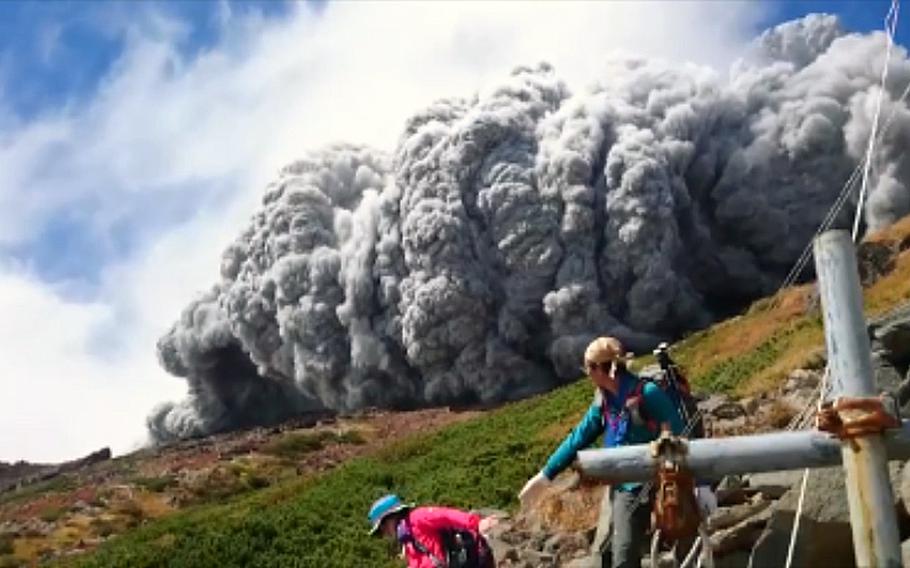
A video screen grab shows hikers scrambling down Mount Ontake, Japan, after it erupted on Saturday, Sept. 27, 2014. The ash cloud would over take the hikers in a matter of seconds. Just before the 90-second video clip ends, hikers can be heard coughing as they are engulfed in swirling ash. (YouTube video)
YOKOTA AIR BASE, Japan — Military officials are warning personnel at Yokota Air Base, the headquarters of U.S. Forces Japan, to be prepared for ash fallout from an erupting volcano.
Central Japan’s Mount Ontake erupted shortly before noon Saturday, stunning more than 200 hikers who were on the popular 10,062-foot peak at the time. At least seven are listed as missing and another 40 people were injured.
The eruption spewed large white plumes of ash high into the sky. Two Jetstar flights headed to Tokyo’s Narita International Airport diverted to Kansai International Airport in western Japan as a precaution, The Associated Press reported.
Watch video of hikers overtaken by ash cloudYokota resdents were advised Saturday by base officials to remain indoors with pets to avoid breathing any ash that might fall.
They also were told to minimize vehicle use during periods of heavy ash fall because of reduced visibility and potential damage to air intakes. People should wear protective equipment when handling and cleaning ash fallout, officials said.
By Sunday afternoon, no ash appeared to have fallen on the base, and a number of people were outside on a warm and sunny fall day. There also was no immediate impact on Naval Air Facility Atsugi, Yokosuka Naval Base, Misawa Air Base or 7th Fleet installations, Navy officials said shortly after the eruption.
However, there are fears that Mount Ontake could erupt again, and Yokota officials warned that the base could be affected “in the next couple of days.”
Ash clouds from volcanic eruptions have the potential to cause huge aviation disruptions because even microscopic bits of volcanic debris are highly abrasive and can damage turbines and other engine parts.
In 2010, an eruption in Iceland sent a plume of ash over much of Western Europe, forcing the cancellation of more than 100,000 commercial flights.
There are numerous active volcanoes in Japan, including the nation’s highest peak, 12,389-foot Mount Fuji, which can be seen from Yokota’s flightline on clear days.
When 8,339-foot Mount Asama – 78 miles northeast of Tokyo -- erupted in 1982, ash dusted the capital.
In a message posted on Yokota’s Facebook page Sunday, officials said flights at the base haven’t been affected yet.
“It depends on the direction the volcanic plume takes and if it becomes a larger issue for air travel through Nagano and Gifu prefectures 125 miles west of Tokyo,” the officials said. “Haneda and Narita Airports are operating normally, though some flights have been delayed or diverted to avoid the area. At this time, international flights are unaffected. Yokota remains fully operational.”
Yokota facility managers and residents, who were initially advised to switch off heating and air conditioning systems, were told they could turn them back on but should be prepared to shut them down again if “changing ashfall conditions” necessitate it, officials said.
Stars and Stripes staffer Erik Slavin contributed to this report.